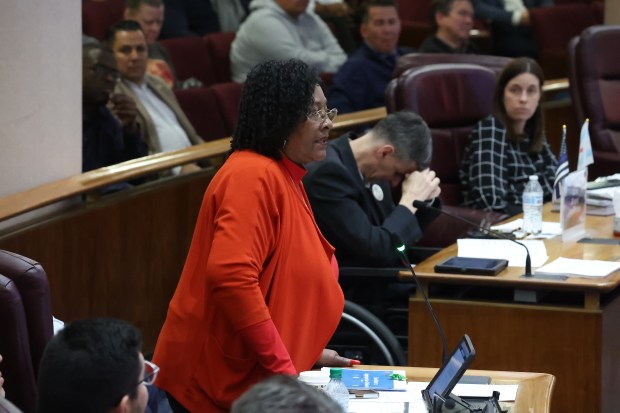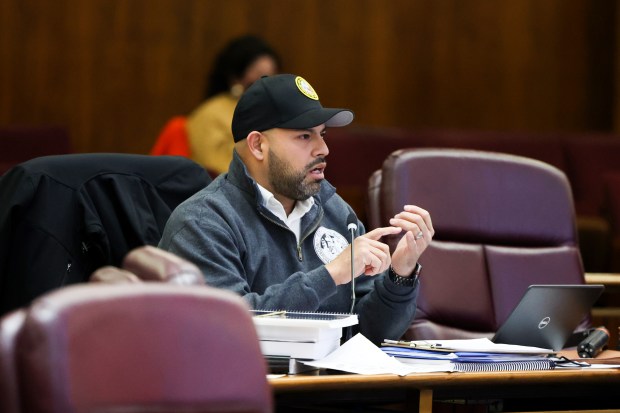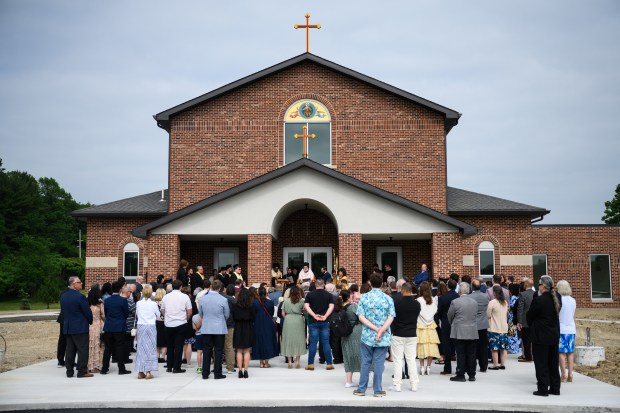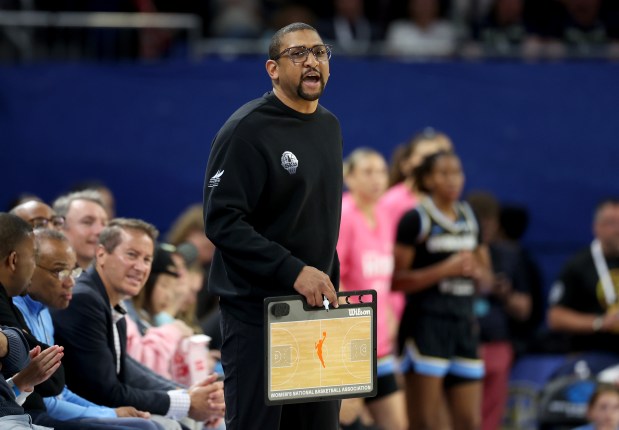When the votes to pass Mayor Brandon Johnson’s 2025 budget finally came together Monday, they were rife with caveats.
Many of the aldermen who finally pushed the spending plan through argued the mayor’s process was disorganized, overly delayed and even disrespectful. But with a critical Dec. 31 deadline looming and property taxes stripped from the $17.1 billion spending plan, they paired their harsh critiques with much-needed approval.
“Some of you ain’t never been in government. Don’t know nothing, can’t nobody tell you nothing,” longtime Ald. Emma Mitts, 37th, told Johnson before casting a crucial “yes” vote as the package passed 27-23. “Running around here like you have all the answers. You don’t have all the answers!”
The chaotic two-month negotiation over the city budget is now over. But the pile of criticism it ended with might be an omen for Johnson. Aldermen increasingly think he indeed does not have the answers, and instead of following the City Hall convention of looking to the fifth floor to chart Chicago’s course, they could instead start looking inward.
Key figures in the aldermanic Progressive Caucus voted against the budget or blasted Johnson for his handling of the spending plan. The mayor’s most steadfast opponents grew more organized as the monthslong debate dragged on. The City Council’s middle has expressed frustration with perceived disorder and long-term fiscal instability.
Altogether, it adds up to a force Johnson must grapple with: likely the most empowered and independent City Council that Chicago has seen in decades.
Johnson’s budget process “left the City Council fractured” and “Chicagoans less trusting in government,” Ald. Maria Hadden, 49th, said during the debate. While Hadden later voted for the spending plan, her Progressive Caucus co-chair, Ald. Andre Vasquez, voted against it.
“I think there are real concerns about the judgment and decision-making that’s occurring,” Vasquez, 40th, said Tuesday. “This did not feel collaborative. It didn’t feel like something where they were leading on. It felt like a mess that people suddenly at the end felt like they had to close up before it got to a shutdown.”
Vasquez successfully pushed for the process to change in the future. As a part of the budget, the mayor’s budget director is required to give aldermen a midyear report on city finances and quickly share annual budget forecasts. The new rules also call for earlier department hearings and better access to finance data for aldermen. But the mayor’s budget process still needs an “autopsy” after one of the narrowest and latest spending plan approval votes in decades, Vasquez said.
“We’ve got to wait to see if they have learned from some of how this all went, or if they feel like they just got another victory and double down,” he said.
Asked about the criticism after the vote Monday, Johnson — who repeatedly described himself as the city’s “collaborator-in-chief” throughout the budget process — argued his final budget in fact reflected the concerns aldermen raised. He praised his budget office’s outreach with aldermen and touted decisions to shrink his own staff, make cuts and drop property tax hike plans as evidence that he responded to the City Council.
“Isn’t that proof that we actually worked together, if the ideas in which people signed on to, wanted to see come to fruition and we actually did it?” Johnson said.
He added that he was “very proud” of the City Council’s work and praised aldermen for “finding their voices.”
Ald. William Hall, 6th, predicted after the vote the budget-strained City Hall relationships will soon be repaired.
“This is life, and in life, we got moments where you disagree, but we’re not disconnected. We’re not disconnected,” Hall said.
Johnson appointed Hall last fall to lead a new Revenue Subcommittee tasked with finding new sources of funds for Chicago, a signal to aldermen that they would have more control and earlier involvement in crafting this year’s budget. The subcommittee met only once and never publicly discussed specific plans.
But the mayor did find an array of ways to get the city government more money. His final budget included a flurry of new fine and fee hikes, like raised cloud computing and digital subscription taxes and additional speed cameras. That mix largely replaced the $300 million property tax hike Johnson initially proposed as necessary “to fund the future of our city,” despite a campaign promise to not raise property taxes.
Johnson’s delayed Oct. 30 budget address was the first time many aldermen learned of the massive property tax hike proposal. His close ally, Ald. Byron Sigcho-Lopez, 25th, gathered TV cameras and came out against the idea moments later — the first drop in a deluge of opposition that forced Johnson to propose dropping the hike to $150 million, then to $68 million before finally fully removing it altogether.
Ald. Gilbert Villegas, 36th, said credit for the property tax hike’s demise should in part go to the bloc of 15 aldermen who aggressively campaigned against it and called for deep spending cuts that never materialized. The group made broad demands that Johnson shrink Chicago’s government, but did not offer much in specific plans.
In the future, the City Council should get the tools it currently lacks to craft its own budget so it can better negotiate with the mayor, Villegas said. The current process, where only mayors have control of the large budget staff needed to piece together a spending plan, only allows aldermen to “check the mayor’s math,” he said.
“I think my colleagues realized the power that they have,” he said. “I think they are realizing that they are a co-equal branch and that the City Council members are not a division of the Mayor’s Office.”
Other aldermen extracted critical concessions from Johnson as the mayor turned to horse-trading to gather enough votes. Johnson added $500,000 for a city-run sidewalk snow plowing pilot program to win over Ald. Daniel La Spata, 1st, and promised $30 million for an Ogden Park field house to get Ald. David Moore, 17th, on board.

There was little praise for the budget — and virtually none unfettered — in the debate before Monday’s vote.
In the end, it was just barely enough.
Trust is lacking at City Hall right now, the 24-year veteran Mitts said. Going forward, Johnson’s administration must bring more aldermen in to craft policy, she said. She criticized the budget process for having “no collaboration, no engagement” and decried learning of major developments in negotiations from media reports instead of Johnson administration officials.
The mayor’s small margin of victory could easily evaporate if he doesn’t start taking City Council concerns more seriously, Mitts warned.
“I think the snowball keeps rolling now,” she said. “It doesn’t take anything for the wind to blow a different way and he is stuck again.”
Chicago Tribune’s A.D. Quig contributed.





